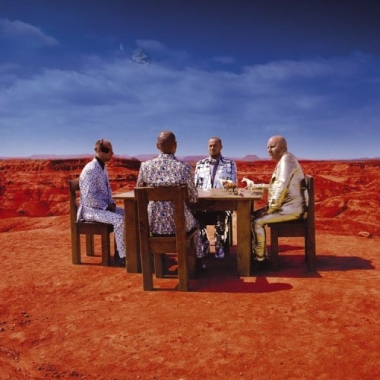 Album Review
Album ReviewBlack Holes and Revelations, by Muse
Epic sounds, prog rock influences, excellent musicianship and beautiful production. Given the current trend toward simplicity and ‘keeping it real’ this album dares to be different, which is to be admired. However, there is still something missing… and I think I know what it is.
Any album this BIG – Bellamy’s expansive guitar work, souring lead vocals and multi-tracked vocal harmonies – is bound to invite comparison to the kings of rock theatricality, Queen. Black Holes and Revelations offers a glimpse of what Queen might have sounded like if their obsessions had been death, Christianity and 6th form politics, opposed to bicycles, good old fashioned lover boys and whatever it was Bohemian Rhapsody was about.
Queen never took themselves too seriously whereas Muse often do. Bellamy’s lyrics are not oblique or articulate enough to forego a smattering of light-heartedness, as evidenced on Muse’s previous album, Absolution, which reached for a dark, introspective, Radiohead vibe, but settled on a naff, whiny, teenage false start. How can you be so serious when you have so little to say?
Thankfully, Black Holes and Revelations is not nearly as grey as Absolution, and, unsurprisingly, it is when hints of colour creep into the mix that the album shines. Black Holes ups the anti on all of Muse’s previous efforts by exploring avenues of musical style they had not previously ventured into.
Track one is Take a Bow, little more than an overblown and overlong introduction. It builds towards… not a lot, and just to further emphasise the fact it fizzles out into static at the end. This track stands alone as a typical Muse opener, seemingly wanting to invoke the apocalypse through volume alone.
Then we get the good stuff. First up is Starlight, a conscious attempt on the part of the band to make a radio friendly single, and in that aim they were successful. I have heard this track described, not inaccurately, as Keane-like: it is driven by a catchy piano hook and love song-ish lyrics, but black holes, spaceships, and guitars elevate it. The next track is Supermassive Black Hole, the album’s lead single and probably its best song. Sung in falsetto, evoking Prince, this is "proto-rock robot funk" of the highest order. Map of the Problematique is enjoyable Depeche Mode sounding Goth-pop, and Soldier’s Poem is a pleasant little ditty, the only quieter song on the album.
The second half of the album is much weaker and contains few highlights, the only standout being the electronic stomp of City of Delusion.
Undoubtedly the album’s centrepiece and the moment it builds towards is Knights of Cydonia, which encompasses all the things the album does well, along with all the elements it does not do well. The good: the ‘Knights’ the title refers to are the four horseman of the apocalypse, and Cydonia is an area on the surface of Mars. This exhibits a wholly appropriate sense of the absurd. But then you have the bad: Queen styled multi-tracked harmonies, which build to a riff Brian May would have... got rid of.
Far from a bad album, but not a classic either, a nine point score in NME had me expecting more. That said, I think I would rather have a dozen Muse-a-likes reaching for the stars and falling short than listen to Arctic Monkeys ramble on about stuff that reminds me just how dull this planet can be.
 Subscribe to my feed
Subscribe to my feed
0 Comments:
Post a Comment
<< Home